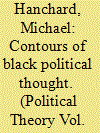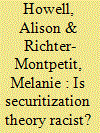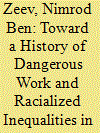|
|
|
Sort Order |
|
|
|
Items / Page
|
|
|
|
|
|
|
| Srl | Item |
| 1 |
ID:
098329


|
|
|
|
|
| Publication |
2010.
|
| Summary/Abstract |
This essay aims to demonstrate how attention to black political thought might expand and complicate our understanding of modern politics and the conceptualization of the political in contemporary political theory, and in modern politics more generally. Black political thought can be viewed as the attempt to develop a set of critical tools to help explain the political distinctiveness of black life-worlds and how this distinctiveness is structured by a series of relations between individual and community, self and other, state and society, citizen and non-citizen, and national and multinational (or global) circumstances. Too often, black politics is exclusively considered as a form of minority group politics and phenomena reducible to empirical investigation and observation, rather than a set of practices with underlying conceptual, theoretical, and epistemological premises. If we understand race as a fundamentally relational concept, namely, an assumption of dynamic interaction between two or more putatively distinct groups, and racism as a political phenomena that is conditioned and articulated through politics, then taken together they provide the opportunity for reflection and consideration of how black peoples and subjects have conceptualized, created and engaged in politics, political communities, and their articulation. Race and racism, the modalities of political participation and, conversely, the modalities of political exclusion have been recurrent themes in black political thought. The distinctiveness of black political thought is symptomatic of the distinctive trajectories of black politics, which first emerged from spaces of exclusion in Western polities and colonies. The histories of black political and social movements provide evidence of the ways in which black subordination in Western societies and polities required the reconfiguration of the actual boundaries between the public and private, the political and the social. Race and racism, the distinction between identity and identification, black solidarities, and the relationship between history, context, and politics and the political are themes central to black political thought.
|
|
|
|
|
|
|
|
|
|
|
|
|
|
|
|
| 2 |
ID:
173879


|
|
|
|
|
| Summary/Abstract |
This article provides the first excavation of the foundational role of racist thought in securitization theory. We demonstrate that Copenhagen School securitization theory is structured not only by Eurocentrism but also by civilizationism, methodological whiteness, and antiblack racism. Classic securitization theory advances a conceptualization of ‘normal politics’ as reasoned, civilized dialogue, and securitization as a potential regression into a racially coded uncivilized ‘state of nature’. It justifies this through a civilizationist history of the world that privileges Europe as the apex of civilized ‘desecuritization’, sanitizing its violent (settler-) colonial projects and the racial violence of normal liberal politics. It then constructs a methodologically and normatively white framework that uses speech act theory to locate ‘progress’ towards normal politics and desecuritization in Europe, making becoming like Europe a moral imperative. Using ostensibly neutral terms, securitization theory prioritizes order over justice, positioning the securitization theorist as the defender of (white) ‘civilized politics’ against (racialized) ‘primal anarchy’. Antiblackness is a crucial building-block in this conceptual edifice: securitization theory finds ‘primal anarchy’ especially in ‘Africa’, casting it as an irrationally oversecuritized foil to ‘civilized politics’. We conclude by discussing whether the theory, or even just the concept of securitization, can be recuperated from these racist foundations.
|
|
|
|
|
|
|
|
|
|
|
|
|
|
|
|
| 3 |
ID:
189546


|
|
|
|
|
| Summary/Abstract |
In recent years, a high number of fatal work accidents in the construction industry in Palestine/Israel has led several Israeli civil society organizations to begin documenting and publicizing the details of work accidents and identities of the victims. This novel documentation work has laid bare the unequal racialized distribution of dangerous work and bodily harm in the land. Palestinian construction workers from across the Green Line consistently constitute the overwhelming majority of victims of construction accidents, followed by migrant workers. Considering the long history of racial divisions of labor in Israel/Palestine over the last century, and building on the insights of scholarship on disability and political economy, this essay argues for the historical study of dangerous work as a crucial field of inquiry for scholars seeking to understand inequality, exploitation, the production of difference, settler colonialism, and communities’ experiences of these phenomena and processes in Palestine/Israel since the early twentieth century.
|
|
|
|
|
|
|
|
|
|
|
|
|
|
|
|
| 4 |
ID:
183875


|
|
|
|
|
| Summary/Abstract |
Before 1914 scholars of international thought frequently relied on racist arguments, yet the ways that race was used varied widely from author to author. This article charts the way that race was used by two groups of Anglophone writers. The warriors used biological arguments to construct views of international affairs that relied on racist analysis. Pacifists might have used racist language that relied more on cultural prejudices, and would often base their more progressive views of international affairs on the idea of a civilizing mission. Using A. T. Mahan and Brooks Adams as exemplars of the warrior approach, and Norman Angell and H. N. Brailsford for the pacifists, I argue that race and racism play an important part in international thought before the First World War. This racism was directed at the colonized in the global South, Indigenous peoples in settler colonial states, and Jews in the global North. This use of race and racism in pre-First World War international thought has implications for how we view the development of International Relations today. It is not just statues and stately homes that require a thorough reassessment of attitudes to race, but also our understanding of the progression of ideas in international thought.
|
|
|
|
|
|
|
|
|
|
|
|
|
|
|
|
|
|
|
|
|